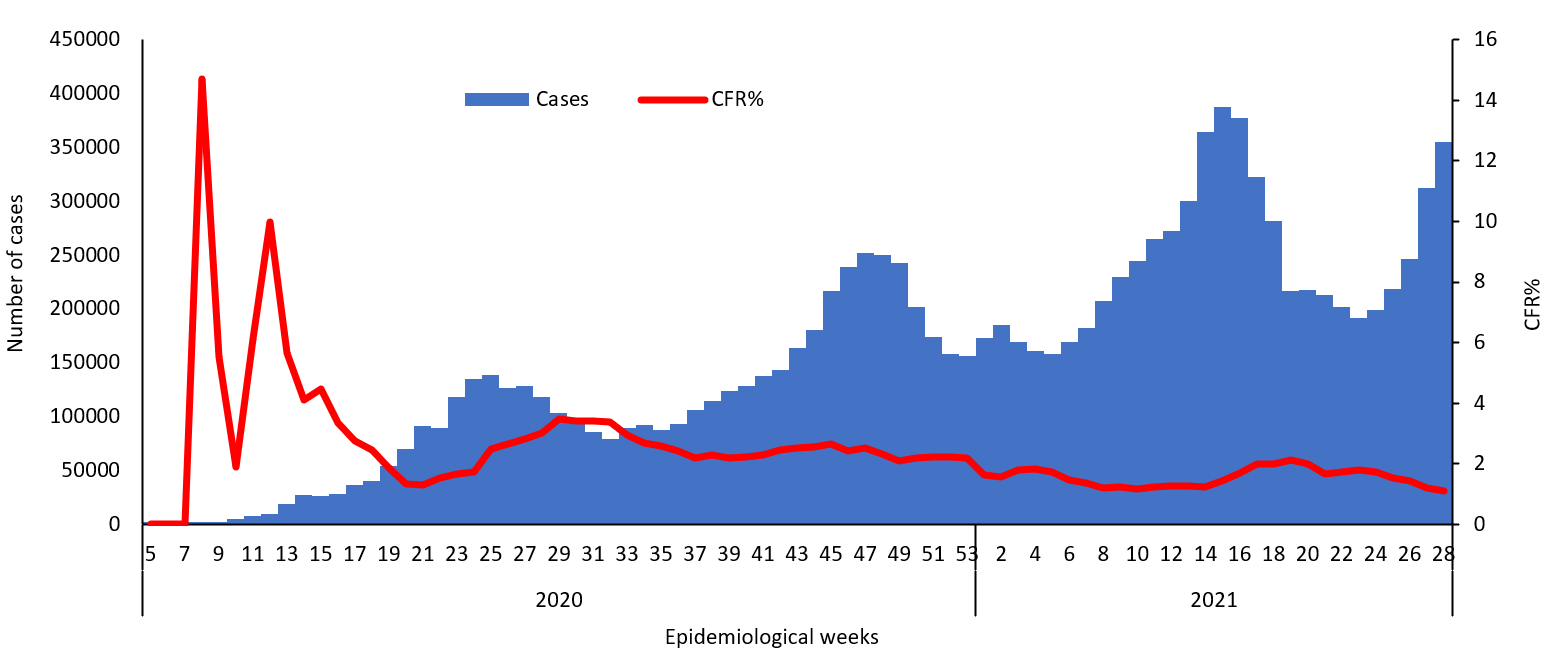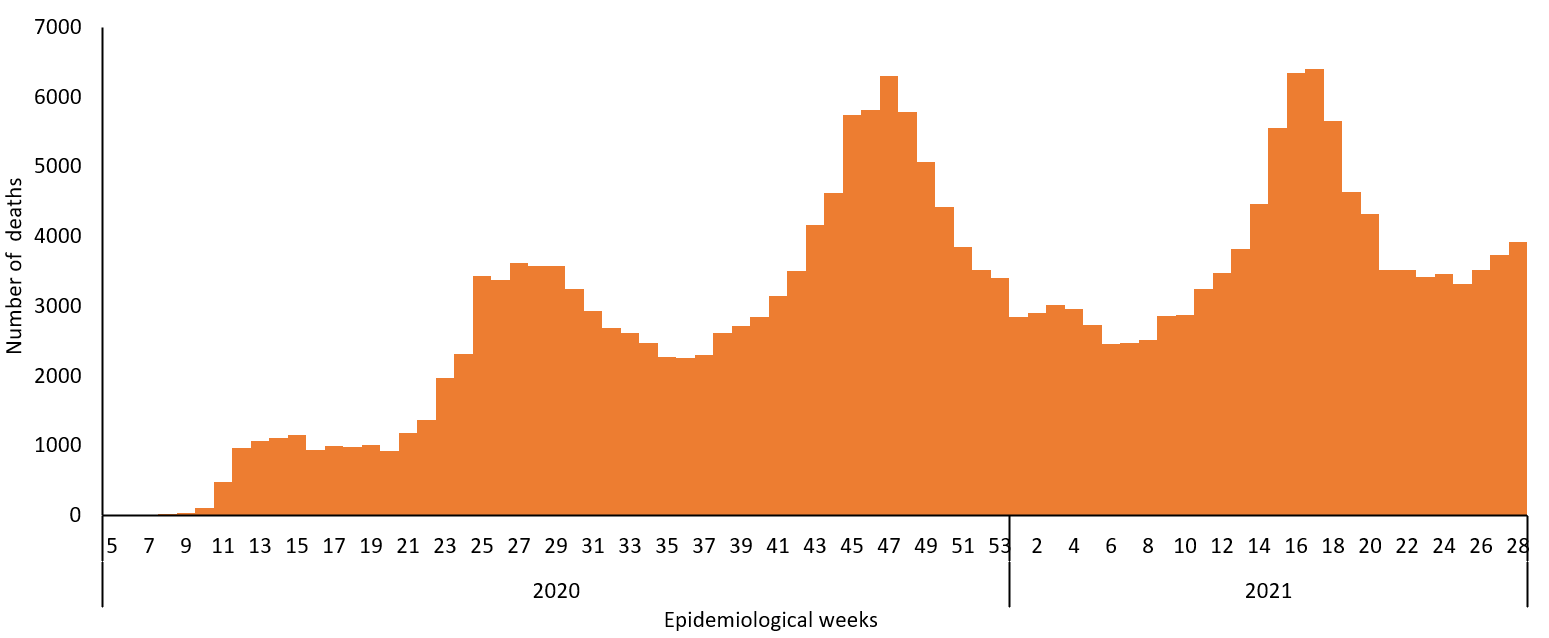The coronavirus disease COVID-19 continues to spread at the regional and global levels. As of 17 July 2021, global cumulative incidence reached 189 288 911 reported cases and 4 076 713 associated deaths with a case fatality ratio (CFR) of 2.2%. Meanwhile, the 22 countries of the Eastern Mediterranean Region (EMR) have reported a total of 11 807 433 cases, which represent about 6.2% of the global count, with 226 687 associated deaths (CFR 1.9%). Most countries in the Region are in the community transmission phase.
Since the beginning of the outbreak, the country that has reported the highest number of total cases in the Region is Islamic Republic of Iran (3 501 079 cases; 29.7% of the Region’s total), followed by Iraq (1 483 014; 12.6%) and Pakistan (989 275; 8.4%). Islamic Republic of Iran also reported the highest number of total associated deaths (86 966; CFR 2.5%) followed by Pakistan (22 781; CFR 2.3%) and Iraq (17 789; CFR 1.2%). The highest CFRs were reported by Yemen (19.6%) followed by Sudan (7.5%), while the lowest CFRs were reported by Qatar (0.27%), United Arab Emirates (0.29%) and Bahrain (0.52%).
During epidemiological week 28, the Region reported an increase in cases of 13.4% when compared to the previous week (354 529 cases compared to 312 538 cases). Similarly, an increase of 4.8% was observed for associated deaths (3917 deaths compared to 3737 deaths).
Tunisia, Libya and Afghanistan reported a relative increase in COVID-19 activity in week 28. The cumulative number of cases increased from 497 613 to 546 233 in Tunisia (a 9.8% weekly increase), from 204 090 to 221 495 in Libya (an 8.5% weekly increase) and from 134 653 to 141 499 in Afghanistan (an 5.1% weekly increase). Afghanistan, Tunisia and Kuwait had the largest relative increase in deaths.
In terms of testing, a total of 182 026 094 laboratory PCR tests were conducted since the start of the outbreak across the Region including 4 827 536 tests in week 28, which shows an 2.4% increase compared to the previous week when 4 712 515 tests were conducted. The highest number of PCR tests were reported from United Arab Emirates (62.5 million), followed by Islamic Republic of Iran (24.9 million) and Saudi Arabia (23.6 million). The United Arab Emirates and Bahrain are performing the highest rates of testing per capita (6251/1000 and 3007/1000, respectively). The average positivity rate for the Region is 6.5%. WHO recommends a positivity rate of around 3–12% as a general benchmark indicating adequate testing, which was achieved in most countries of the Region.
Meanwhile, COVID-19 vaccination continues across the Region. The total number of doses administered so far in the 22 countries is 115 659 915. Saudi Arabia has administered the highest number of doses at 22 188 156, followed Morocco by at 20 833 568 and United Arab Emirates at 16 341 613. On the other hand, the total number of administrated doses in Sudan is 677 957, in Libya is 425 119, in Yemen is 297 405, in Somalia is 249 790, in Syria is 108 276, and in Djibouti is 26 796.*
Supporting countries in the Region
The regional incident management support team continues to coordinate the response and provide technical support to countries and partners in the Region in the areas of coordination and partnership, surveillance, laboratory capacity, clinical management, infection prevention and control, risk communication and community engagement, points of entry according to the International Health Regulations (2005), research, health systems, and essential health services among others.


For more data from the Region, please visit the COVID-19 dashboard.
*The data on vaccination is obtained from a number of sources including media reports and country websites for ministries of health.
Subscribe to the monthly infectious hazard preparedness newsletter of WHO’s Health Emergencies Programme for latest data and analysis on epidemic- and pandemic-prone diseases, as well as news on outbreak preparedness and response within WHO’s Eastern Mediterranean Region.









